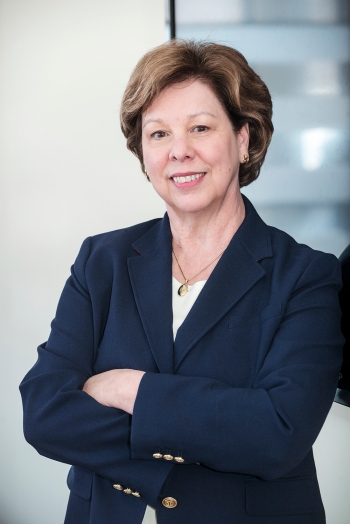
By Ed Hayward | Chronicle Staff
Institute for Scientific Research Director Patricia Doherty’s efforts to promote advanced navigation research throughout the world, and especially in developing countries, have earned her the Captain P.V.H. Weems Award from the Virginia-based Institute of Navigation (ION).
Doherty is concluding a two-year term as president of ION, where she has led an international initiative to expand positioning, navigation and timing (PNT) technology and professional development, particularly in developing countries in Africa.
“The science of navigation has been a major focus of my career,” said Doherty, whose research interests focus on the ionosphere, space weather and the Global Positioning Satellite System (GPSS). “Using it to make connections with scientists and students from around the world has been particularly rewarding and has served to benefit BC and the ION.”
The award – which also recognized Doherty’s service to ION – is given in memory of US Navy Captain Philip Van Horn Weems, a principal co-founder of ION, the world’s premier professional society dedicated to the advancement of the art and science of positioning, navigation and timing.
Doherty has been an active researcher in the area of radio wave propagation for more than 20 years, focusing on ionospheric effects in satellite-based navigation, including Satellite-Based Augmentation Systems (SBAS) and the FAA’s Wide Area Augmentation System. She is the co-chair of the International Working Group, has authored or co-authored over 50 technical papers and in 1995 was a co-recipient of ION’s Burka Award.
For the past five years, Doherty has led an initiative to help developing countries derive social and economic benefits from the satellite-based PNT technology. International workshops have linked leading PNT scientists from the US and Europe with teams of professors and scientists from African universities.
The gatherings also have prompted the development of academic programs, led to the installation of GPS receivers in universities in developing countries, and led to the founding of master and doctoral research initiatives. Furthermore, this infrastructure now produces some of the first ionospheric measurements from Africa, a region largely devoid of such data five years ago.
In the future, African governments will be able to use improved PNT capacity to improve food security, natural resource management, emergency location services, surveying and mapping, and greater precision and safety in land, water, and air navigation systems, said Doherty.
“Here in the US we most commonly see GPS guide our cars. In the developing world it can be used for precision farming, better emergency services and monitoring scarce natural resources,” explained Doherty, who said her work monitoring space weather in the 1990s led to her interest in positioning technology. “GPS has many great benefits to society. It’s a phenomenal technology that has been developed and it is free to use. You just have to get out there and use it.”
Compared to single-frequency GPS used in personal navigation devices, the initiative makes available highly accurate multiple-frequency GPS technology, which comes in a container about the size of a breadbox.
With funding from BC, the International Center for Theoretical Physics, the National Science Foundation, NASA and the US Air Force, Doherty has led workshops in Europe, Africa, South America, the Caribbean, and Southeast Asia. The most recent workshop was conducted in Rwanda.
“It’s been very, very successful,” said Doherty, the ISR director since 2008. “We’re academics, so we focus on universities. We felt that if you established these programs to help students use GPS in their research, that could enable them to get jobs in the government and become the drivers behind the adoption of this technology.”
Already, Doherty said the level of graduate research in the topic has increased, universities in Africa are collaborating and the ionosphere data gap on the continent is closing.
“One of the success stories is seeing so many new PhDs coming off the African continent who are studying the ionosphere and they are studying it with the technology we gave them,” said Doherty.



